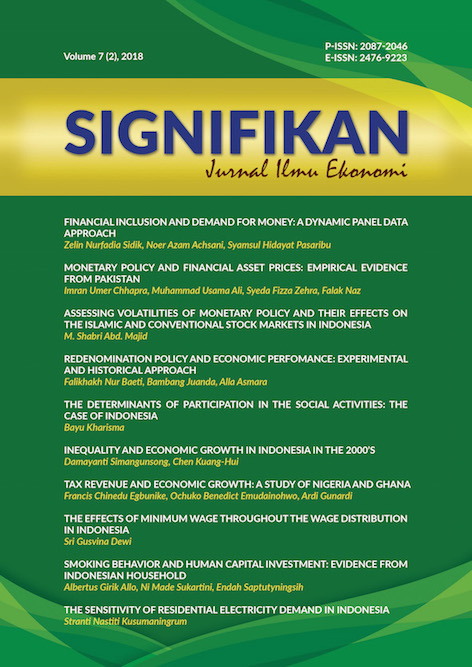Tax Revenue and Economic Growth: A Study of Nigeria and Ghana
DOI:
https://doi.org/10.15408/sjie.v7i2.7341Keywords:
tax, economic growth, gross domestic productAbstract
Tax revenue is frequently considered as an alternative form of sustainable financing within a stable and predictable fiscal environment to promote growth and enable governments to finance their social and infrastructural needs. The objective of the study is to examine the effect of tax revenue on economic growth of Nigeria and Ghana. The study used multiple regressions as tools of analysis. The study finds a positive impact of tax revenue on the gross domestic product of Nigeria and Ghana confirming prior studies. The study recommended among others that adequate measure to ensure that revenue generated from the tax is effectively utilized to develop and grow the economy.
References
Adegbie, F. F., & Fakile, A. S. (2011). Company Income Tax and Nigeria Economic Development. European Journal of Social Sciences. Vol. 22(2): 309-32.
Adereti, S. A., Adesina, J. A., & Sanni, M. R. (2011). Value Added Tax and Economic Growth in Nigeria. European Journal of Humanities and Social Sciences. Vol. 10(1): 456-471.
Afuberoh, D., & Emmanuel, O. (2014). The Impact of Taxation on Revenue Generation in Nigeria: A Study of Federal Capital Territory and Selected States. International Journal of Public Administration and Management Research. Vol. 2 (2): 22-47.
Akhor, S. O., & Ekundayo, O. U. (2016). The Impact of Indirect Tax Revenue on Economic Growth: the Nigeria Experience. Igbinedion University Journal of Accounting. Vol. 2: 62-87.
Babatunde, O. A., Ibukun, A. O., & Oyeyemi, O. G. (2017). Taxation Revenue and Economic Growth in Africa. Journal of Accounting and Taxation. Vol. 9(2): 11-22.
Bonu, N. S., & Pedro, M. P. (2009). The Impact of Income Tax Rates (ITR) on The Economic Development of Botswana. Journal of Accounting and Tax revenue. Vol. 1(1): 8-22.
Chigbu, E. E., Akujuobi, L. E., & Ebimobowei, A. (2012). An Empirical Study on The Causality Between Economic Growth and Taxation in Nigeria. Current research journal of Economic Theory. Vol. 4(2): 29-38.
Dasalegn, M. J. (2014). Value Added Tax as a Tool for National Development in Ethiopia. Research Journal of Finance and Accounting. Vol. 5(15): 184-190.
Delessa, D. (2014). Tax Reforms and Tax Revenues Performance in Ethiopia. Journal of Economics and Sustainable Development. Vol. 13(5): 11-19.
Edame, G. E., & Okoi, W. W. (2014). The Impact of Taxation on Investment and Economic Development in Nigeria. Academic Journal of Interdisciplinary Studies. Vol. 3 (4): 209-218. doi: https://doi.org/10.5901/ajis.2014.v3n4p209.
Engen, E. M., & Skinner, J. (1992). Fiscal Policy and Economic Growth. Journal of Development Economics. Vol. 39(1): 5-30.
Garba, L. S. (2014). Tax Revenue and Economic Growth in Nigeria. (Unpublished Thesis). Zaria: Ahmadu Bello University.
Goode, R. (1984). Governement Finance in Developing Countries. Washington D.C: The Brookings Institute.
Ihenyen, C. J., & Mieseigha, E. G. (2014). Taxation as an Instrument of Economic Growth The Nigerian Perspective. Information and Knowledge Management. Vol. 4(12): 49-53.
Keho, Y. (2013). The Structure of Taxes and Economic Growth in Cote d‟ Ivoire: An Econometric Investigation. Journal of Research in Economics and International Finance. Vol. 2(3): 39-48.
Marire, J., & Sunde, T. (2012). Economic Growth and Tax Structure in Zimbabwe: 1984–2009. International Journal of Economic Policy in Emerging Economies. Vol. 5(2): 105-121.
Musgrave, R. A., & Musgrave, P. B. (2004). Public finance in Theory and Practice. New York: McGraw Hill.
Myles, G. D. (2000). Taxation and Economic Growth. Fiscal Studies. Vol. 21: 141-168.
Nyamadi, G. (2014). Tax Policy and Economic Growth: Evidence from Ghana. (Unpublished Dissertation). Accra: University of Ghana.
Okafor, R. G. (2012). Tax Revenue Generation and Nigerian Economic Development. European Journal of Business and Management. Vol. 4(19): 49-56.
Onwuchekwa, J. C., & Aruwa, S. A. S. (2014). Value Added Tax and Economic Growth in Nigeria. European Journal of Accounting Auditing and Finance Research. Vol. 2 (8): 62-69.
Owolabi, O. A., & Okwu, A. T. (2011). Empirical Evaluation of Contribution of Value Added Tax to Development of Lagos state Economy. Journal of Middle Eastern Finance and Economics. Vol. 1(9): 24-34.
Owusu-Gyimah, A. (2015). Tax Revenue Generation and the Economic Development of Ghana. European Journal of Business and Management. Vol. 7(14): 78-88.
Romer, C. D., & Romer, D. H. (2010). The Macroeconomic Effects of Tax Changes: Estimates Based on a New Measure of Fiscal Shocks. The American Economic Review. Vol. 100: 763-801.
Saibu, O. M. (2015). Optimal Tax Rate and Economic Growth. Evidence from Nigeria and South Africa. EuroEconomica. Vol. 34(1): 41-50.
Takumah, W. (2014). Tax Revenue and Economic Growth in Ghana: A Cointegration Approach. MPRA Paper No. 58532. Retrieved from https://mpra.ub.uni-muenchen.de/58532/1/MPRA_paper_58532.pdf
Takumah, W., & Iyke, B. N. (2017). The Links Between Economic Growth and Tax Revenue in Ghana: an Empirical Investigation. International Journal of Sustainable Economy. Vol. 9(1): 34-55.
Temiz, D., & Gökmen, A. (2014). FDI Inflow as an International Business Operation by MNCs and Economic Growth: An Empirical Study on Turkey. International Business Review. Vol. 23(1): 145-154.
Todaro, M. P., & Smith, S. C. (2006). Economic Development. New Jersey: Pearson Addison Wesley.
Ugwunta, O. D., & Ugwuanyi, U. B. (2015). Effect of Distortionary and Non-Distortionary Taxes on Economic Growth: Evidence From Sub-Saharan African Countries. Journal of Accounting and Taxation. Vol. 7(6): 106-112.

